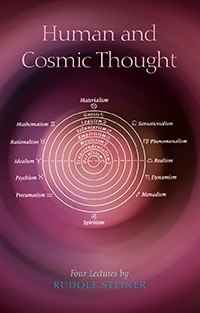Human and Cosmic Thought
4 lectures, Berlin, Jan. 20–23, 1914 (CW 151)
What convinces us of the truth of a certain point of view? Why do we find it difficult to comprehend viewpoints that differ from our own? What are the inner foundations of our knowledge?
In these concentrated and aphoristic lectures, Steiner speaks of twelve main philosophical standpoints, and the importance of understanding each of them. An appreciation of the variety of possible worldviews not only sharpens and makes more flexible our own powers of thinking, but also helps us to overcome a narrow-minded one-sidedness, promoting tolerance of other people and their opinions.
Steiner goes on to explain how each standpoint is also colored by a particular “soul mood” that influences the way we pursue knowledge. Several philosophers and their works are characterized in this way, shedding light on their contributions to human culture. Through such insight into the true nature of human thinking, we are led to understand the quality of cosmic thought and how, in Steiner’s words, people can be seen as a thought that is thought by the cosmic hierarchies.
Human and Cosmic Thought is a translation from Germen of Der menschliche und der kosmische Gedanke (GA 151).
C O N T E N T S:
Introduction by Nick Thomas
1. Jan. 20, 1914: Petrified concepts and concepts brought into movement as an advance from the realm of Spirits of Form to that of the Spirits of Movement
2. Jan. 21, 1914: The possibility of contemplating the world from twelve different standpoints through twelve equally justified world outlooks.
3. Jan. 22, 1914: Relations of the seven world outlooks/moods (planets) to the twelve shades of world outlook (zodiac). The threefold tone in world outlooks (Sun, Moon, Earth). The special case of anthropomorphism (Earth).
4. Jan 23, 1914: Humanity’s place within the spiritual cosmos from the perspective of spiritual astrology (astrosophy). The human being as a thought of the hierarchies.
About the Author
Rudolf Steiner (1861–1925) was born in the small village of Kraljevec, Austro-Hungarian Empire (now in Croatia), where he grew up. As a young man, he lived in Weimar and Berlin, where he became a well-published scientific, literary, and philosophical scholar, known especially for his work with Goethe’s scientific writings. At the beginning of the twentieth century, he began to develop his early philosophical principles into an approach to systematic research into psychological and spiritual phenomena. Formally beginning his spiritual teaching career under the auspices of the Theosophical Society, Steiner came to use the term Anthroposophy (and spiritual science) for his philosophy, spiritual research, and findings. The influence of Steiner’s multifaceted genius has led to innovative and holistic approaches in medicine, various therapies, philosophy, religious renewal, Waldorf education, education for special needs, threefold economics, biodynamic agriculture, Goethean science, architecture, and the arts of drama, speech, and eurythmy. In 1924, Rudolf Steiner founded the General Anthroposophical Society, which today has branches throughout the world. He died in Dornach, Switzerland.












Reviews
There are no reviews yet